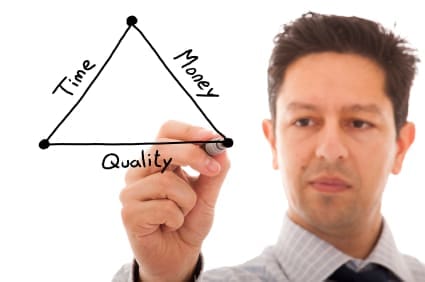A project manager is often expected to deal with a whole range of situations that might not strictly be part of their role. They will often need diplomacy and tact to handle delicate situations, frayed tempers and personality clashes.
In theory, at least, the role of the project manager is well defined but in practise it is much less clear. He/she must be able to tackle a whole range of situations that are not necessarily in his or her job description (that’s assuming there is one of those) if a project is to be managed to a successful conclusion. As well as the usual project management skills of planning, communication, monitoring progress, risk management, change management, reporting etc., a PM must have diplomacy and soft skills to deal with delicate situations, frayed tempers, motivating the team, handling personality clashes and anything else that a complex project might throw at them.
Take the example of a company in a highly specialised technical field. They want a new website in addition to the company website that will serve as a knowledge base for their particular area of expertise. The web design company has been chosen (experts in their field) and a project manager has been assigned to manage the end-to-end project and ensure everything gets done. But there is a gap between what the company are asking for in their familiar terminology and the understanding of the web designers in terminology with which they are familiar. Someone who can translate the technical speak into terms that will allow a new website to be designed is needed. Guess what – that role is also assigned to the project manager. Perhaps more accurately his title should be Project Facilitator, after all it is his job to simply get things done.
This role of project facilitator will be important in both getting the project off to a good start and ensuring it is completed successfully. It will involve assisting in resolving issues of all types, general problem solving and, in the above example, mediation between two parties to ensure they understand one another’s perspective. Both parties are well experienced in their own fields so the project facilitator must bring other clear benefits to the project by making it easier to achieve the desired outcome and ensuring that outcome is better than it would have been without his input. He must promote useful discussions between the different groups that contribute to better decisions and better understanding of what is required. He should also be adept at avoiding non-constructive discussions and disagreements and generally keeping the peace with the sole purpose of completing the project to everyone’s satisfaction.
That’s quite a tall order and often raises the issue of whether the project facilitator needs to be a subject matter expert or not. And the answer is “It depends…”. It depends on the type of project and the skills and expertise of those involved in the project. The facilitator role does not necessarily have to be taken up by the manager but someone with the skills and wisdom to deal with different groups. Technical knowledge of the field is not necessary if the facilitator has experience presenting information in a way that everyone can understand, can guide and control the dynamics of the project team and deal with the challenges of human interaction within and between teams involved in the project.
The ability to act as a project facilitator can be an additional weapon in the arsenal of a project manager and many project management courses include practical advice and tips on developing the skills necessary to work effectively as a facilitator in addition to offering formal PM training

